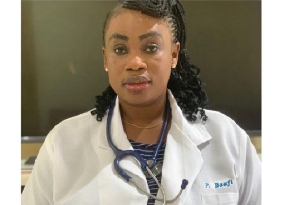- Home - News
- TWI News | TV
- Polls
- Year In Review
- News Archive
- Crime & Punishment
- Politics
- Regional
- Editorial
- Health
- Ghanaians Abroad
- Tabloid
- Africa
- Religion
- Election 2020
- Coronavirus
- News Videos | TV
- Photo Archives
- News Headlines
- Press Release
General News of Tuesday, 31 May 2005
Source: GNA
African scientists to predict weather patterns
Accra, May 31, GNA - An international workshop, aimed at exposing scientists in the West African sub-region to innovational means of predicting the weather accurately through Information, Communication and Technology (ICT), ended in Accra on Tuesday.
The technology called "Super Computer" enables weather experts to predict weather patterns about 30 years ahead in order to warn the public of any possible disaster.
The workshop, which was sponsored by the Italy-based Abdus Salam International Centre for Theoretical Physics (ICTP) on the theme: "High Performance Computing Applications In Regional Climate Modelling", also aimed at bridging the digital divide between the developed and developing countries.
Mr Clement Onime, a Coordinator at ICTP said the workshop would initiate an active human capacity development in climate research in the sub-region.
About 30 participants drawn from Ghana, Nigeria, Senegal, Benin and La Cote d'Ivoire were taken through topics like: "The Physical Processes that Regulate Regional Climates", "Regional Climate Modelling", "Climate Variability and Climate Change Prediction at the Regional Scale" and "Seasonal Predictability of West African Monsoon Drought". He said the programme would harness the region's research potentials and provide solutions that could advance socio-economic development.
Mr Onime expressed the hope that in future more African countries would be able to have their weather forecasts on international television channels.
Dr Joseph Instiful, Principal Investigator for the project, noted that, there was a link between the climate, environment and socio-economic development of a country.
A report from the Third Assessment of the Intergovernmental Panel on Climate Change, a non-governmental organization, indicates that there will be an increase in the occurrence of extreme weather events for which developing countries; especially those in sub-Saharan Africa will be the most venerable.
Dr Instiful, also from the Centre for Development Research at the University of Bonn, Germany, said the main source of power for socio-economic development in the sub-region is hydro-based, which depends mainly on rainfall and its distribution.
He said it was therefore important to organize the training programme in West Africa, to establish regional capacities in climate research to address climatic and environmental problems.
Ms Dorothy Gordon, Director-General of the Ghana-India Kofi Annan Centre of Excellence in ICT, said the programme was made possible through the partnership Ghana had developed with Africans in the Diaspora.
Professor Francis Allotey, a renounced Ghanaian Mathematician with the Institute of Mathematical Sciences was the brain behind the programme.










